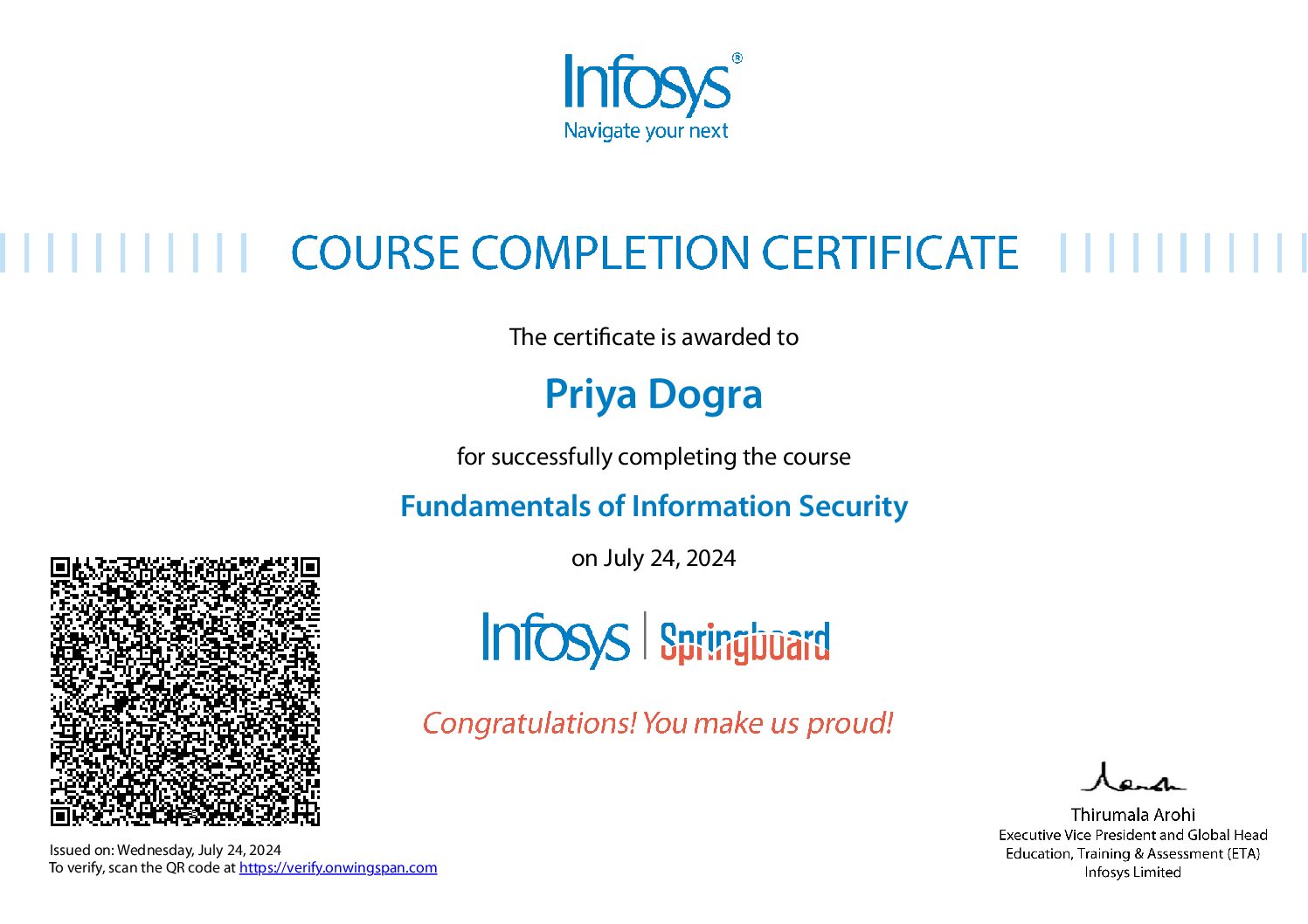Question 1: What is the output of the following snippet?
#include <iostream>
#include <exception>
using namespace std;
int main() {
try {
throw 2./4;
}
catch(int i) {
cout << i;
}
return 0;
}
- Compilation fails
- 0.5
- Execution fails
- 0
Question 2: What is the output of the following snippet?
#include <iostream>
#include <exception>
#include <stdexcept>
using namespace std;
class X : public logic_error {
public:
X() : logic_error(“0”) {};
};
void z() throw(logic_error) {
X x;
throw x;
cout << 1;
}
int main(void) {
X x;
try {
z();
} catch(logic_error &i) {
cout << i.what();
}
return 0;
}
- Execution fails
- 0
- Compilation fails
- 1
Question 3: What is the output of the following snippet?
#include <iostream>
#include <exception>
#include <stdexcept>
using namespace std;
class Int {
public:
int v;
Int(int a) : v(a) {}
};
void a() {
throw Int(1);
}
void b() {
try {
a();
} catch(Int &i) {
throw Int(i.v + 1);
}
}
void c() {
try {
b();
} catch(…) {
throw;
}
}
int main(void) {
try {
c();
} catch(Int &i) {
cout << i.v;
}
return 0;
}
- 0
- Compilation fails
- 1
- 2
Question 4: What is the output of the following snippet?
#include <iostream>
using namespace std;
class X {
public:
X(void) throw(int) { cout << 1; }
~X(void) throw(int) { cout << 2; }
void exec() { throw string(“0”); }
};
void exec(X x) {
x.exec() ;
}
int main(void) {
X x;
try {
exec(x);
} catch(int &i) {
cout << i;
}
return 0;
}
- 102
- Compilation fails
- Execution fails
- 120
Question 5: What is the output of the following snippet?
#include <iostream>
#include <exception>
#include <stdexcept>
using namespace std;
class X : public logic_error {
public:
X() : logic_error(“0”) {};
};
void z() throw(X) {
throw new logic_error(“0”);
}
int main(void) {
X x;
try {
z();
} catch(X &i) {
cout << i.what();
}
return 0;
}
- Execution fails
- Compilation fails
- 120
- 102
Question 6: What is the output of the following snippet?
#include <iostream>
#include <exception>
using namespace std;
int main() {
try {
throw 2/4;
}
catch(int i) {
cout << i;
}
return 0;
}
- Execution fails
- 0.5
- 0
- Compilation fails
Question 7: What is the output of the following snippet?
#include <iostream>
#include <exception>
#include <stdexcept>
using namespace std;
class E {};
void f(int i) {
E e;
switch(i) {
case 0 : throw e;
case 1 : throw &e;
}
cout << 0;
}
int main(void) {
try {
f(2);
} catch(E*) {
cout << 1;
} catch(E) {
cout << 2;
}
return 0;
}
- 0
- Compilation fails
- 2
- 1
Question 8: What is the output of the following snippet?
#include <iostream>
#include <exception>
#include <stdexcept>
using namespace std;
class X : public runtime_error {
public:
X() : domain_error(“0”) {};
};
void z() throw(X) {
X x;
throw x;
cout << 1;
}
int main(void) {
X x;
try {
z();
} catch(X &i) {
cout << 1;
}
catch(domain_error &i) {
cout << 0;
}
return 0;
}
- Compilation fails
- Execution fails
- 0
- 1
Question 9: What is the output of the following snippet?
#include <iostream>
using namespace std;
class X {
public:
X(void) { cout << 1; }
~X(void) { cout << 2; }
};
X *exec() {
X *x = new X();
throw string(“0”);
return x;
}
int main(void) {
X *x;
try {
delete exec();
} catch(string &s) {
cout << s;
}
return 0;
}
- Execution fails
- 10
- 12
- Compilation fails
Question 10: What is the output of the following snippet?
#include <iostream>
using namespace std;
class X {
public:
X(void) { cout << 0; }
~X(void) { cout << 2; }
};
int main(void) {
try {
X *x = new X();
throw true;
delete x;
} catch(bool s) {
cout << s;
}
return 0;
}
- Execution fails
- 021
- 01
- Compilation fails
Question 11: What is the output of the following snippet?
#include <iostream>
#include <exception>
#include <stdexcept>
using namespace std;
class E {};
class X {
public:
static int c;
X(int a) { c = a; }
~X() { if(c++ > 2) throw new E; }
};
int X::c = 0;
void f(int i) {
X* t[2];
for(int j = 0; j < i; j++)
t[j] = new X(i+1);
for(int j = 0; j < i; j++)
delete t[j];
}
int main(void) {
try {
f(2);
} catch(…) {
cout << X::c;
}
return 0;
}
- Compilation fails
- 2
- 2
- 3
Question 12: What is the output of the following snippet?
#include <iostream>
#include <exception>
#include <stdexcept>
using namespace std;
class E {};
class X {
static int c;
public:
X() { if(c++ > 2) throw new E; }
~X() { if(c++ > 2) throw new E; }
};
int X::c = 0;
void f(int i) {
X a,b;
cout << i;
}
int main(void) {
try {
f(0);
f(1);
} catch(…) {
cout << 1;
}
return 0;
}
- Execution fails
- 0
- 01
- Compilation fails
Question 13: What is the output of the following snippet?
#include <iostream>
#include <string>
using namespace std;
class X {
public:
X(void) { cout << 1; }
~X(void) { cout << 2; }
};
void exec() {
{
X x;
}
throw string(“0”);
}
int main(void) {
try {
exec();
} catch(string &s) {
cout << s;
}
return 0;
}
- 102
- Execution fails
- 120
- Compilation fails
Question 14: What is the output of the following snippet?
#include <iostream>
#include <exception>
#include <stdexcept>
using namespace std;
class Int {
public:
int v;
Int(int a) : v(a) {}
};
void a() {
throw 0;
}
void b() {
try {
a();
} catch(int i) {
throw Int(i + 1);
}
}
void c() {
try {
b();
} catch(…) {
throw;
}
}
int main(void) {
try {
c();
} catch(Int &i) {
cout << i.v;
}
return 0;
}
- Compilation fails
- 0
- 2
- 1
Question 15: What is the output of the following snippet?
#include <iostream>
#include <exception>
#include <stdexcept>
using namespace std;
class E {};
void f(int i) {
E e;
switch(i) {
case 0 : throw e;
case 1 : throw &e;
}
cout << 0;
}
int main(void) {
try {
f(1);
} catch(void *) {
cout << 2;
} catch(E*) {
cout << 1;
}
return 0;
}
- 0
- 1
- 2
- Compilation fails
Question 16: What is the output of the following snippet?
#include <iostream>
using namespace std;
class X {
public:
X(void) throw(int) { cout << 1; }
~X(void) throw(int) { cout << 2; }
void exec() { throw 0; }
};
void exec(X &x) {
x.exec() ;
}
int main(void) {
X x;
try {
exec(x);
} catch(int &i) {
cout << i;
}
return 0;
}
- Execution fails
- 120
- 102
- Compilation fails
Question 17: What is the output of the following snippet?
#include <iostream>
#include <exception>
using namespace std;
int main() {
throw 2/4;
catch(int i) {
cout << i;
}
return 0;
}
- Compilation fails
- 0.5
- Execution fails
- 0
Question 18: What is the output of the following snippet?
#include <iostream>
#include <exception>
using namespace std;
int main() {
try {
throw exception();
}
catch(exception &x) {
cout << x.what();
}
return 0;
}
- It prints a non-empty string
- Execution fails
- Compilation fails
- It prints an empty string
Question 19: What is the output of the following snippet?
#include <iostream>
#include <exception>
using namespace std;
int main() {
try {
throw 3.14;
}
catch(double x) {
x *= 2;
}
cout << x;
return 0;
}
- It prints a non-empty string
- Execution fails
- Compilation fails
- It prints an empty string
Question 20: What is the output of the following snippet?
#include <iostream>
#include <exception>
#include <stdexcept>
using namespace std;
class X : public domain_error {
public:
X() : domain_error(“0”) {};
};
void z() throw(X) {
X x;
throw x;
cout << 1;
}
int main(void) {
X x;
try {
z();
} catch(X &i) {
cout << 1;
}
catch(domain_error &i) {
cout << 0;
}
return 0;
}
- Execution fails
- 1
- 0
- Compilation fails
 Priya Dogra – Certification | Jobs | Internships
Priya Dogra – Certification | Jobs | Internships



